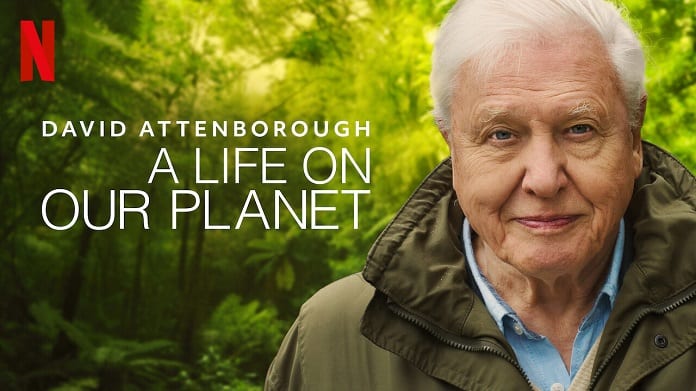Focusing on his extraordinary career documenting the natural world from 1954 to the present day, David Attenborough’s Netflix documentary A life on our planet is a plea for action to end humanity’s destructive impact.
But framed as the story of how “man” came to decimate “wild”, when it comes to locating the causes and solutions to environmental destruction it comes up short. Attenborough not only attributes the wrong causes for this destruction but argues for measures that do nothing to challenge its essentially capitalist roots.
The documentary covers everything from the impacts of deforestation, commercial over-fishing, farming, and the cascading effects of carbon emissions on the planet. We witness the brutal decimation and extinction of animal species, the disappearance of polar ice-caps, the bleaching of coral reefs, and horrific fires like the ones Australia experienced at the beginning of 2020. The planet is hurtling towards catastrophe. Major change is needed, and soon.
Population growth
What is driving the destruction? For Attenborough, the answer lies with unsustainable human consumption and population. This is a common view that can be traced back to the 18th century conservative political economist, Thomas Malthus. Malthus argued that population growth would eventually outstrip the capacity to feed people, resulting in poverty and economic crisis.
Attenborough echoes him, remarking that “human beings have overrun the world” and that “we” as a species, are all essentially to blame for the destruction of “the wild”. The documentary reinforces the point multiple times through statistics linking growing population size, increasing carbon emissions, and the decreasing percentage of wilderness remaining through the years of the famed presenter’s life. As human populations grow, so does environmental destruction – so the story goes.
Attenborough points out that population growth is already declining in rich countries and argues that the best way to stop population growth globally is by improving people’s health, education and standards of living. While this would be welcome, it also casts blame on populations in the “global south”.
In fact climate change is a problem largely caused by rich, industrialised countries. Not only have the bulk of emissions over the past 150 years come from rich countries, but these same countries also have higher per capita emissions than the rest of the world. The focus on population also opens a door to racist proposals to limit immigration from the global south.
The documentary gives the impression that everyone is equally or at least comparably responsible for environmental destruction. On the contrary, just 100 companies were responsible for 71 per cent of global carbon emissions between 1998 and 2015.
Environmental destruction is not a problem of human society in general, but a problem of capitalism and how production is organised.
Under capitalism, a small minority of people running large corporations and governments make the decisions that are destroying our planet. Decisions about what to produce and how companies are run are determined not on the basis of human or environmental needs, but what is profitable. Ordinary people’s purchase or consumption of goods happens down the line from where these decisions are made, with little ability to influence them.
Market conditions
Governments such as our own could be pursuing the rapid shift to renewable energy we need. Instead, they insist we wait for the right market conditions to arise to stimulate private investment. Instead of banning new oil and coal developments, these continue because they remain massively profitable.
At one point in the documentary Attenborough exclaims that, “It’s crazy that our banks and our pensions are investing in fossil fuels.” These crazy decisions are the result, not of ordinary people’s consumption habits, but of the way that capitalism’s insatiable drive for profit informs decisions on where to invest.
Attenborough offers a diverse suite of other solutions, including switching from fossil fuels to renewable energy, adopting sustainable fishing practices, and a plant-based diet. What all his proposed solutions have in common are that they ignore the capitalist roots of the environmental crisis and the barriers capitalism places on measures to address it.
For example, one of his proposals is to extend no-fishing zones – currently confined to small geographic areas – over large areas of the ocean through global co-operation. But in a competitive global economy, any company or country that refuses to join this effort gains a competitive advantage and can make higher profits. In a world that is also deeply structured by inequality, fishers in poor countries would also reject an agreement that takes away their livelihood.
Although Attenborough’s documentary vividly describes the severe and wide-ranging destruction of the planet, it misidentifies population as the central problem and market-friendly measures as the solution.
We must instead locate the roots of environmental destruction squarely in capitalism and demand solutions that address both problems together. And, crucially, we must orient to empowering the global working class as the agents of change and potential gravediggers of the rotten system that is killing the planet.
This means building on the inspiring global climate strikes led by school students in 2019 before COVID-19 hit, which mobilised hundreds of thousands of students, workers and unionists.
By Tom Fiebig
A life on our planet is streaming on Netflix.






